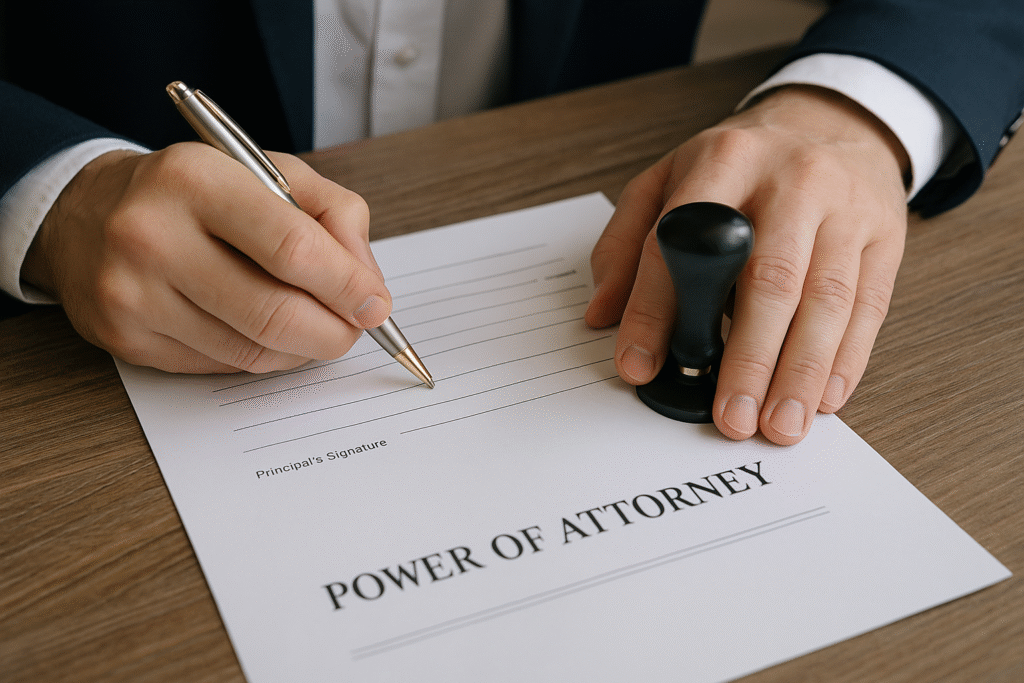Overview
If you sign a Power of Attorney (POA) in California and need it recognized in China,
the receiving party must be confident the document is genuine and properly executed.
In most cases, that means the principal signs before a
California notary public,
and the notarized POA is authenticated with a
California apostille.
This process helps ensure the document is accepted by Chinese authorities, courts, and financial institutions.
It aligns with international standards established by the
Hague Apostille Convention.
What Is an Apostille?
An apostille is a special certificate issued by a competent authority—such as the
California Secretary of State—
that verifies the authenticity of a notary’s signature and commission. It allows a public document issued in one country
to be recognized in another that also participates in the Hague Apostille Convention.
The apostille eliminates the need for additional embassy or consulate authentication, streamlining cross-border document recognition.
China’s 2023 Change & Why It Matters
As of November 7, 2023, China officially joined the Hague Apostille Convention.
This means U.S. documents—including those from California—now only need an apostille to be recognized in China.
Previously, applicants had to obtain multiple authentications and Chinese consulate legalization.
The Chinese Ministry of Foreign Affairs confirmed that apostilled documents are accepted without further consular steps,
although recipients may still impose format or translation requirements. Learn more from the official
Chinese Consulate in New York.
Why the Principal’s Signature & Notarization Matter
The Power of Attorney is only valid if the principal—the person granting authority—signs it correctly.
In California, that usually means signing before a commissioned notary.
The apostille then verifies that the notary’s signature and seal are legitimate.
- Authenticity: The apostille certifies the notary’s commission and authority.
- Legal compliance: China relies on notarization to confirm identity and consent.
- Acceptance abroad: Without this chain, Chinese authorities may reject the POA.
For more about notarization standards, visit our
Notary Services page.

Step-by-Step: California → China POA
- Draft the POA carefully.
Specify the agent’s powers and include your full legal name exactly as shown on your passport. - Sign before a California notary.
The notary performs an acknowledgment or jurat as appropriate. - Obtain the apostille.
Submit your notarized document to the California Secretary of State for authentication. - Translate the document.
Most offices in China require a certified Chinese translation. Our
certified translation services
cover both POA and apostille pages. - Confirm local requirements.
Different Chinese bureaus or banks may request specific document formats or issue dates.
Common Situations That Require It
- Real Estate Transactions: Granting authority to sell or manage property in China.
- Corporate Representation: Allowing an agent to sign contracts or appear before Chinese authorities.
- Personal Legal Matters: Empowering relatives to handle inheritance or family-related filings.
Having an apostilled POA ensures the document will be honored under international law,
reducing delays or rejections during sensitive transactions.
Cautions & Practical Tips
- Verify before sending: The apostille authenticates the notarization but does not guarantee acceptance by every Chinese authority.
- Originals required: Chinese agencies typically require the original document with apostille attached.
- Translation accuracy: Poor translations can cause rejection; always use a certified translator.
- Document age: Some recipients require a POA issued within the last six months.
- Keep copies: Scan and store digital copies before shipping originals overseas.
For detailed state instructions, see the
California Secretary of State Apostille guide.
FAQs: Apostilling a California Power of Attorney for Use in China
Do I still need Chinese consular legalization after November 7, 2023?
No—China’s accession to the Hague Apostille Convention on November 7, 2023 means most eligible U.S. documents no longer require consular legalization. Always confirm requirements with the receiving office in China.
Who must sign the Power of Attorney?
The principal must sign the POA before a California notary. Some Chinese institutions may ask for the agent’s countersignature, so verify locally before sending documents abroad.
Does the POA have to be notarized to get an apostille?
Yes. For privately executed documents, the apostille certifies the notary’s signature and authority. Learn more at our Apostille Services page.
Can I use online notarization (RON) and still get accepted in China?
Possibly. If the state that performed the remote notarization also issues the apostille, it is typically valid. However, some Chinese recipients still prefer in-person notarization—confirm before proceeding.
Do I need a Chinese translation of the POA and apostille?
Usually yes. Banks, registries, and bureaus in China often require Chinese translations of both the POA and the apostille. See our Certified Translation Services.
Will China accept a scan or photocopy?
No. The original notarized and apostilled document is generally required for legal or financial processing.
How recent does the POA need to be?
Some Chinese authorities require the POA to be dated within the last 3–6 months. Confirm this timeline before preparing your document.
How long does a California apostille take?
Processing varies by mail and office backlog. The California Secretary of State typically completes standard apostilles in 3–5 business days once received.
My POA was notarized outside California. Can I still use it in China?
Yes, but the apostille must come from the same U.S. state where the notarization occurred. A California apostille only covers documents notarized in California.
Do names have to match my passport exactly?
Yes. Use your legal name as printed on your passport or Chinese records. Discrepancies can delay or void acceptance abroad.
Do I also need U.S. Department of State authentication?
No. The apostille replaces federal and consular authentication for eligible documents between Apostille Convention member countries.
What’s the simplest, low-risk workflow?
Draft the POA clearly → principal signs before a California notary → obtain California apostille → translate into Chinese → confirm recipient’s intake rules before shipping.
Need Help?
Our team at Anshin Mobile Notary & Live Scan can handle every step—California notarization,
apostille coordination, and certified translation for China-bound documents.
Visit our Apostille Services page to schedule your appointment today.

